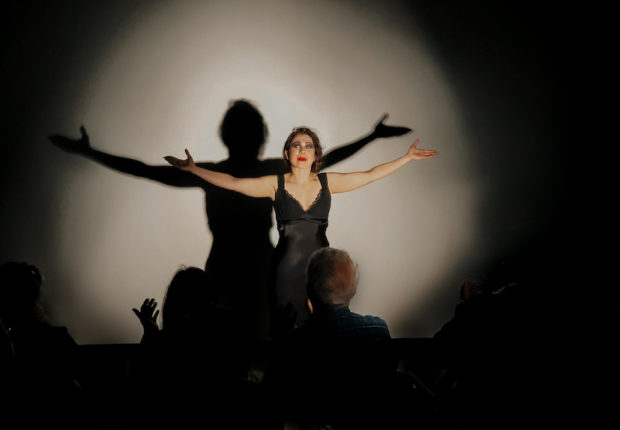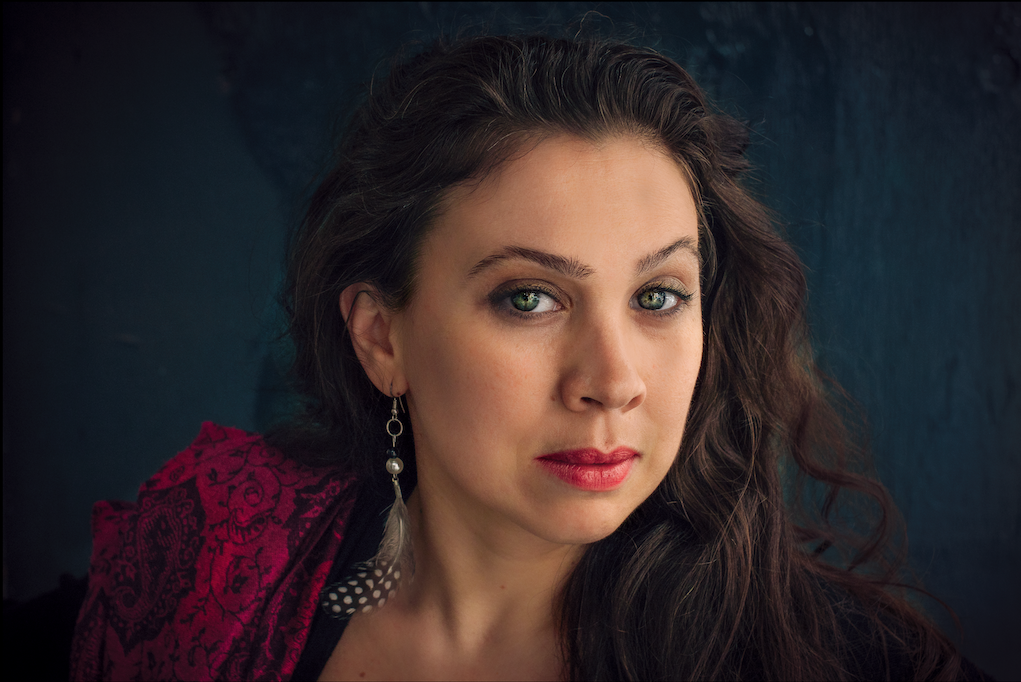Entertainment Show
Sicilian, woman and diva. Elenora Micali in "A Fantasiusa Donna: A Nonologo"
At Fordham University in New York, the actress who recites vivid fragments of her life as a woman, her soul as an artist and her heart as a migrant

Eleonora Micali. Ph: Giuseppe_Malpasso.
A university classroom is perhaps not the place where you would expect to see something spectacular. Still, our date with this imaginative woman was set right in a classroom at Fordham University in New York. In the simple and bare space, a bit 'aseptic as befits a place used for listening without distractions, I see Eleonora Micali approaching, and I see it suddenly filling the void of the room, changing its energy, its specific weight, its meaning. A long black dress, a shawl, a simple but decisive make-up, the white of the face, the very blue eyes, the bright lipstick and an expression that is already in a still image the sum of all that is going to tell us. A lively, jovial, intense and veiled melancholy face. His face is now like a still but magnetic mask from which you can't or don't want to look away, like a painted face whose eyes chase you, almost compel you to confront. Black and white, a hint of red and the blue of the eyes are the colors with which Eleonora paints a room that now turns into a theater stage. Then Eleonora adds her voice to the color, a full, visceral, magmatic voice a voice that reminds us of the burnt and heartbroken songs of Rosa Balistrieri for the Sicilian countryside, a voice that smacks of earth and instinct. Following the actress in her colorful anecdotal story of some of the episodes of her life, the stage is now transformed into the ancient Greek theater of Syracuse, now in the portrait of the small town of the Sicilian province of which she is originally, Lentini, now in the glories but also in the true coattagine of Rome Capital, now in the suggestion of the bourgeois theaters of Paris well of the nineteenth century.

PH: Giuseppe Malpasso.
Here the figure of Emile Zola's Nanà is used by the actress a bit like a muse, as a tutelary deity, a figure of her great dream that has always been to become a sparkling actress, a femme fatale who charms her audience even with his charms as a woman, but who knows how to keep all the stubbornness and strength of those who know they started from scratch. And the public Eleonora charms him and keeps him always attentive while maintaining a witty, light, surreal and at times tragicomic and grotesque tone. He smiles at the somewhat folkloristic tales of the characters of his family, which as in a novella by Pirandello, are told as people and also as masks, irresistible characters. The actress takes us into her world, and does it by intermingling her Sicilian dialect, fearlessly, boldly and without fear of being in front of an American public that might not understand it. Beyond the expedient of the subtitle that guides reading, the comprehension of the text comes directly from the truth, from the veracity of Eleonora who on stage knows how to represent all the colors of her land, and all the women of her family, giving us a real compendium of the Sicilian woman. A strong woman, strong-willed, matriarch, enterprising, intelligent, witty, at times rigid, "marshal" as Eleonora's mother is called in her family and as was her grandmother, a figure evoked with sweetness and heartfelt emotion. Women "black as pitch" but of a "dazzling white", to paraphrase a passage from the "nonologist". "In Sicily we are extreme in everything," says the actress.
"A Fantasiusa Donna: A Nonologo", is an experiment certainly very ambitious, which has already received important consents in Sicily, Rome and recently in Brooklyn, and it is certainly a challenge both for Eleonora Micali and for the Roman director Stefano Maria Palmitessa. The challenge is already implicit in the nature of the show, a one-woman show in Italian, in Sicilian and Roman dialect, which wants to address the great Italian and Italian-American community well represented in the United States, but which has not even the slightest ambition to overcome those boundaries and open to the curiosity of the American public. Eleonora Micali also embodies an ideal and a type of Italian actress who has managed to establish herself also in Hollywood: Anna Magnani, Monica Vitti, Sophia Loren, Gina Lollobrigida. Micali possesses that Mediterranean not only physical but also of dramatic attitude that could well revive that imaginary in a more modern and perhaps more disenchanted key. If a defect can be found in the show it is perhaps linked to its somewhat simplistic production plant, to its mise-en-scène that I am sure it will still be able to make a qualitative leap; but the profuse talent on stage is absolutely enveloping and manages to keep the show in its minimalism. Perhaps I would like to see Eleonora become a little more Nanà if necessary, to dare more with the costumes, on the other hand we are in the homeland of the great Broadway musicals, but I already know that I would never want to lose Eleonora, the strong and imaginative woman, who I will hardly forget and I will want to go back to review. If a defect can be found in the show it is perhaps linked to its somewhat simplistic production plant, to its mise-en-scène that I am sure it will still be able to make a qualitative leap; but the profuse talent on stage is absolutely enveloping and manages to keep the show in its minimalism. Perhaps I would like to see Eleonora become a little more Nanà if necessary, to dare more with the costumes, on the other hand we are in the homeland of the great Broadway musicals, but I already know that I would never want to lose Eleonora, the strong and imaginative woman, who I will hardly forget and I will want to go back to review. If a defect can be found in the show it is perhaps linked to its somewhat simplistic production plant, to its mise-en-scène that I am sure it will still be able to make a qualitative leap; but the profuse talent on stage is absolutely enveloping and manages to keep the show in its minimalism. Perhaps I would like to see Eleonora become a little more Nanà if necessary, to dare more with the costumes, on the other hand we are in the homeland of the great Broadway musicals, but I already know that I would never want to lose Eleonora, the strong and imaginative woman, who I will hardly forget and I will want to go back to review. but the profuse talent on stage is absolutely enveloping and manages to keep the show in its minimalism. Perhaps I would like to see Eleonora become a little more Nanà if necessary, to dare more with the costumes, on the other hand we are in the homeland of the great Broadway musicals, but I already know that I would never want to lose Eleonora, the strong and imaginative woman, who I will hardly forget and I will want to go back to review. but the profuse talent on stage is absolutely enveloping and manages to keep the show in its minimalism. Perhaps I would like to see Eleonora become a little more Nanà if necessary, to dare more with the costumes, on the other hand we are in the homeland of the great Broadway musicals, but I already know that I would never want to lose Eleonora, the strong and imaginative woman, who I will hardly forget and I will want to go back to review.
English Showreel 2019 from Eleonora Micali on Vimeo .
However, there are still margins of encounter and more punctual mergers between Eleonora and her alter ego Nanà, between the woman and the diva, just as there is still room to clean the dramatic transitions between one scene and another. . It will be interesting to follow the evolution of this precious picture of life in motion that the actress is preparing to take on tour. First stop in Matera, where in addition to this monologue there will also be an international preview of "A Fantasiusa Woman: A Manhattologist", the ideal sequel to the first that will tell about her adventures in New York. The show will then be presented in Puglia, Basilicata, Sicily and Malta. On 6 November instead Eleonora will be a guest of NYU Casa Italiana Zerilli-Marimòand subsequently in the main cities of North America. A big applause also to the association Arba Sicula, an international non-profit organization based in New York that presented the show in collaboration with the Fordham University Lincoln Center. Arba Sicula does an important job of promoting Sicilian culture in the United States. The organization is directed by Gaetano Cipolla who was professor of Italian and chair at the Department of Foreign Modern Languages at St. John's University in New York. Cipolla is also the author of literary essays and translator of important texts of Sicilian literature in English.
For more information and to follow Eleonora Micali in her next steps, click here .
For more information on Arba Sicula, click here .
